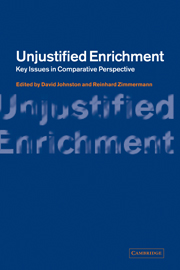Book contents
- Frontmatter
- Contents
- List of contributors
- Preface
- Table of cases
- List of abbreviations
- I Introduction
- II Enrichment ‘without legal ground’ or unjust factor approach
- III Failure of consideration
- IV Duress and fraud
- 6 In defence of unjust factors: a study of rescission for duress, fraud and exploitation
- 7 Fraud, duress and unjustified enrichment: a civil-law perspective
- V Change of position
- VI Illegality
- VII Encroachment and restitution for wrongs
- VIII Improvements
- IX Discharge of another person's debt
- X Third-party enrichment
- XI Proprietary issues
- XII Taxonomy
- Index
6 - In defence of unjust factors: a study of rescission for duress, fraud and exploitation
Published online by Cambridge University Press: 31 July 2009
- Frontmatter
- Contents
- List of contributors
- Preface
- Table of cases
- List of abbreviations
- I Introduction
- II Enrichment ‘without legal ground’ or unjust factor approach
- III Failure of consideration
- IV Duress and fraud
- 6 In defence of unjust factors: a study of rescission for duress, fraud and exploitation
- 7 Fraud, duress and unjustified enrichment: a civil-law perspective
- V Change of position
- VI Illegality
- VII Encroachment and restitution for wrongs
- VIII Improvements
- IX Discharge of another person's debt
- X Third-party enrichment
- XI Proprietary issues
- XII Taxonomy
- Index
Summary
Introduction
A fundamental difference between the English and the German laws of unjust enrichment is the way in which each establishes that enrichment is ‘unjust’ and so reversible. §812(1) of the German Civil Code (the BGB) states that a person who, through an act performed by another, or in any other way, acquires something at the expense of that other person without legal ground is bound to render restitution. This general enrichment action has been described as ‘probably the most outstanding feature of the German law of unjustified enrichment’. More recently English law has also recognised the general principle of restitution to reverse unjust enrichment but, in contrast, it is ‘engaged in crystallising the principles into rules adapted to the different types of case so as to meet the specific interests involved in them’. An influential classification proposed by Peter Birks sets out the specific factors that can make the plaintiff's transfer of wealth to the defendant ‘unjust’ in the eyes of English law. Thus, while the German approach appears to yield restitution whenever defendants cannot advance a legal cause for retention, English law leaves defendants with their enrichments unless the plaintiffs can show why they should not keep them.
Many commentators observe that this apparent structural divergence probably yields no significant differences at the level of actual outcomes. Konrad Zweigert and Hein Kötz explain why ‘too much should not be made of the apparent differences’:
[I]t is manifest that an approximation will take place in the theoretical treatment of these areas of law. […]
- Type
- Chapter
- Information
- Unjustified EnrichmentKey Issues in Comparative Perspective, pp. 159 - 193Publisher: Cambridge University PressPrint publication year: 2002
- 2
- Cited by

